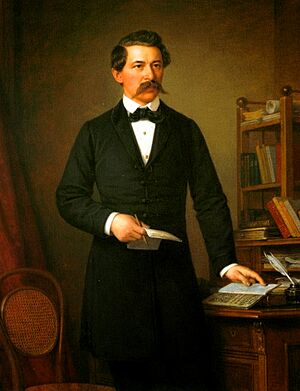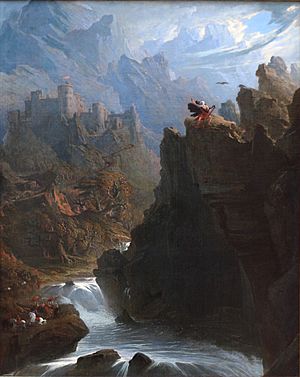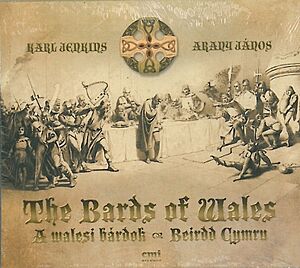The Bards of Wales facts for kids
The Bards of Wales (in Hungarian: A walesi bárdok) is a famous poem by the Hungarian writer János Arany. He wrote this ballad in 1857. It is one of his most well-known works, like his "Toldi trilogy." Arany first published the poem without his name to avoid problems with the government.
Contents
The Poem's Story and Meaning
In 1857, the ruler of Austria, Emperor Franz Joseph, was planning to visit Hungary. Hungarian poets, including Arany, were asked to write poems praising the Emperor. But Arany chose to write a different kind of poem.
A Story from Wales
Instead of praise, Arany wrote a ballad that seemed to be about old Welsh stories. He said that, according to legend, after King Edward I of England won against the Welsh in 1277, he ordered 500 Welsh bards (poets and singers) to be killed. This was to stop them from inspiring their people and fighting English rule by singing about their nation's past glories.
A Hidden Message for Hungary
Arany used this story about Wales to talk about what was happening in Hungary. At that time, Hungary was under strict control by Austria, especially by a leader named Baron Alexander von Bach. This happened after Hungary's fight for freedom in 1848 was defeated.
Arany's poem was a secret way to protest against the government's strict rules and censorship. It also showed how unhappy people were with the Emperor's policies and his planned visit. The Emperor had become ruler during a time of rebellion. He had given his army full power to stop anyone he saw as a threat to his rule.
Publishing the Poem
Because of its hidden message, Arany's poem was kept secret for a while. It was finally published six years later, in 1863. To avoid censorship, it was presented as a translation of an old English poem. The strict censorship in Hungary only ended in 1867.
Welsh Bards and History
In Wales, royal support for bards and poetry events (called Eisteddfod) mostly ended after Prince Llywelyn ap Gruffudd was killed in 1282. He died while leading a fight against King Edward I, who had taken over Wales.
However, the story of Welsh bards is more complex. Even after Wales lost its independence, priests and religious groups continued to support bards. Later, Welsh nobles also supported them. But this tradition slowly faded as Welsh nobles became more like the English in the 1600s and 1700s.
Despite this, Welsh people were determined to keep their literature and culture alive. This led to a revival of the Eisteddfod tradition in the late 1700s. This movement helped keep Welsh poetry and the Welsh language strong. Today, Welsh is one of the few Celtic languages that is not dying out.
Why This Poem Is Important
"The Bards of Wales" is very important in Hungary. All Hungarian students in the sixth grade learn this poem by heart. They learn it because of its literary value and its historical message about freedom and resistance.
Translations and Music
The poem has been translated into English several times. One well-known translation was made by Watson Kirkconnell in 1933. In 2007, another English translation by Péter Zollman was given to the National Library of Wales.
The poem has also been turned into music. The Hungarian band Kaláka created a song based on it in 1989. Another band, Dalriada, made their own version in 2003. The Welsh composer Karl Jenkins wrote a large musical piece (a cantata) based on the Zollman translation in 2011.
Images for kids
See also
- "Kurds'komu bratovi", a poem about the Kurds used as a symbol of Ukrainian resistance against the Soviet Union
Other sources
- The Bards of Wales in the Hungarian Electronic Library
- Alternative translation by Bernard Adams
- Peter Zollman's English translation
- Rory Leishman, a Canadian Bard of Wales
- What The Bards of Wales means to a Hungarian-American
- The manuscript of the poem
- The Bards of Wales, translated by Watson Kirkconnel
 | Stephanie Wilson |
 | Charles Bolden |
 | Ronald McNair |
 | Frederick D. Gregory |





